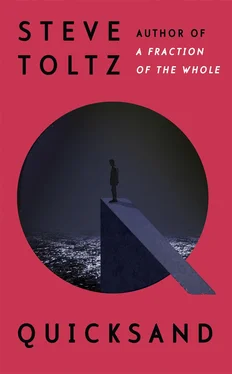Mimi had gone pale. It wasn’t difficult to understand what had happened. We’d given him the transformative experience needed to spur his liberation, to pursue his lifelong dream of becoming a painter.
— Yes, I want to do something like that, he said, looking at one of Maria Hamilton’s collages.
He might have been a former teacher-cum-blackmailee who had turned the tables on his tormentors, but he was also a struggling artist anxiously preparing his first solo exhibition. And he was totally exhilarated, pacing and weaving through the room, touching every fixture.
— This place is wonderful! So bohemian! Aldo! Mimi! You should come down and see my rooms! I’ve already had significant interest from several galleries— well, former students now running galleries.
Oh God, I thought. Is there anything more dangerous than a time-poor unappreciated man with a whiff of glory? Mimi and I must have both looked pretty silly, with our stillness and gaping jaws. Was he really going to live here? With his woollen vest and sinusitis? I found it difficult to orient myself all of sudden. I looked out the glass doors at the steel-grey sky. A thick gust of wind sent the weathervane spinning. Beside me, in the face of Morrell’s uncoiled mayhem, Mimi had grown cold, her breathing unnatural, laboured. He picked up a paint-splattered red bandana from the floor and tied it around his head; he smiled vigorously at everyone, as if granting them permission to continue about their life choices. He pointed to Frank Rubinstein’s semi-abstract painting of a slice of toast.
— We need to believe that you mastered a technique and decided not to use it, not that you never had it.
He bounced from one artwork to another, almost stumbling over canvases to pick them up, holding etchings to the light, gesturing at photographs, scrutinising sculptures. He examined Lynne Bishop’s pastel drawings of rotund babies.
— Either aim your dream at the higher end of within reason, or isolate the greatest achievement of a second-rate peer and strive for that.
I thought: Being a teacher really permeates one’s being; a fireman isn’t a fireman at dinner, whereas a teacher is a teacher at a molecular level. Still, I detected the tone of stored-up resentment from witnessing generation after generation of artists celebrated younger and younger.
Morrell was gazing at a bronze sculpture of a giant hand.
— I like this one. I feel positively menaced by it. But why are you trying so hard to be contemporary? You are alive in the present. It doesn’t matter what you do. You are contemporary.
He praised and castigated in the same breath; he knew how to humiliate and excite.
— This one. No, I am not seduced.
That’s right. I am not seduced was Morrell’s most repeated line. It had a catchphrase quality to it and we loved to hear him say it.
— I can’t believe I ever gave these up, he said, lighting another cigarette. Now he stood at the glass doors on tiptoes, as if trying to make out the semi-naked women who were no more than blurs on flat sand.
— What do you think about this self-portrait? Louise Bozowic asked, holding up a square acrylic painting.
— Either learn to paint hair or learn to paint hats.
Louise wrote that down. The swiftness with which the artists took to Morrell was crazy. They lined up to show him their woodcuts and slide projects and reverse-glass paintings and graph-paper sketches. Maybe it was their sensitivity to criticism and their greater sensitivity to praise that made them feel so flattered; he critiqued in one breath and asked their advice on his upcoming show in the next; he was both mentor and student. He linked arms with whomever he was talking to. Forty years of never being able to touch the people he taught, now he touched everybody, while seemingly determined to expel those four decades of acquired wisdom in a single night.
— Stop trying to stop being derivative.
— Don’t let your palette tell you what to do.
— If you can’t be great, be vague. If they don’t know what you’re trying to achieve, they can’t see that you haven’t succeeded in achieving it.
Morrell shouted across the room at me.
— Hey, I sold my home! You’ve been there, Benjamin, it was no sort of place at all. That pathetic container I lived in for thirty-six years, that I bought for sixty-five thousand in 1977, I sold for 1.3 million. Bam! Just like that! My neighbour had wanted me to sell for years so he could extend his hideous compound!
Morrell’s energised, meth-like high had no foreseeable comedown.
— Aldo, Mimi whispered, what are we going to do? She wasn’t crying, but her voice was full of tears. Morrell bounded over and leaned between us.
— Don’t look so frightened, girl. I will still pay your ten thousand a month.
— In return for what? I asked.
— Don’t mumble, Benjamin.
I learned from Dee Franklin that he had rented two of the interconnecting rooms down below, that he’d come in with a handful of cash and bargained Casey Huntington for the biggest space in the residency, adjacent to the other biggest space in the residency in which he intended to stretch his 2-metre x 2-metre canvases.
— This way, girl.
I whipped my head around to see Morrell coaxing Mimi downstairs for a private tour of his new paintbrushes. I made a move to follow, but Mimi shot me a sharp look that made me feel like I had confessed to a crime too late, after an innocent man had already been executed.
XXI
Through a crack in the door, I could see Morrell on his knees undoing Mimi’s shoelaces and talking about the ‘impersonal yet melancholy’ photographs in The Fussy Corpse . I went back to Mimi’s bedroom and tried to draw a permanent veil over my heart. Morrell had made the whole residence feel like a sleazy motel, and she was acquiescing in some kind of trance, as if he was pressing on an old injury from which she’d never recovered, or more likely, yes, instead of our silence — our initial offer — her actual body was now the goods demanded by Morrell in exchange for his ten thousand a month. Blackmailed by the blackmailee! Talk about a backfire! I threw a pillow across the room and gazed out the window. The moon looked wan and weak from not having lately been worshipped.
Around midnight her phone vibrated on the nightstand.
— I’m not in the mood tonight, I said.
— What are we going to do about her old high school teacher?
— How do you know about that?
I heard Elliot stub out a cigarette on something that crackled, and for a split second I entertained the notion it was human skin. My head started to hurt. On the other end of the phone, there was shouting, a chanting of deep powerful voices, the sound of footsteps, a scuffle and several emphatic no ’s. Then a long silence. And in that silence, more silence.
— You don’t know anything about Mimi, do you?
— No, I suppose I don’t.
— Did you know she has a tilted uterus?
— So?
— I was there when her mother died. She took photos of the burial.
— That’s not so strange.
— She made her father hold the reflector board throughout the service.
— She’s an artist.
— She ran away from home at ten. You know that? At eleven. At fifteen. Almost every year she packed a bag. Hurried out. Came back. Bid those needy shits an au revoir. Ran away. Buggered off. Came back. Mother passed out. Cousin banging something sharp against something hollow. Hello! Fuck off! Adios! Hello! Taking care of them even when she started taking drugs. And found boyfriends. Older ones. Much older ones. Homeless ones. Imagine. Those rosebud lips. At that age. Can’t stand to think about it. One day: took every dollar out of her father’s wallet. Shredded them. Tossed the cunt thin strips of paper. Here, Daddy, saved you a trip to the track. From then on, she rescued them from drowning in their own vomit. Then pierced their ears as they dribbled in narcotic stupors. Yeah. She yielded to their needs all right. Then emptied their bank accounts. Followed their crappy orders then pawned their shit. Push-back. Payback …
Читать дальше











